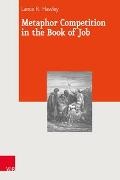Mehr lesen
Within the book of Job, the interlocutors (Job, the friends, and Yahweh) seem to largely ignore one another's arguments.
This observation leads some to propose that the dialogue lacks conceptual coherence. Lance Hawley argues that the interlocutors tangentially and sometimes overtly attend to previously stated points of view and attempt to persuade their counterparts through the employment of metaphor.
Hawley uses the theoretical approach of Conceptual Metaphor Theory to trace the concepts of speech and animals throughout the dialogue. Beyond explaining the individual metaphors in particular texts, he shows how speech metaphors compete with one another, most perceptibly in the expressions of job's words are wind. With regard to animal metaphors, coherence is especially perceptible in the job is a predatory animal metaphor. In these expressions, the dialogue demonstrates intentional picking-up on previously stated arguments.
Hawley argues that the animal images in the divine speeches are not metaphorical, in spite of recent scholarly interpretation that reads them as such. Rather, Yahweh appears as a sage to question the negative status of wild animals that Job and his friends assume in their significations of people are animals. This is especially apparent in Yahweh's strophes on the lion and the wild donkey, both of which appear multiple times in the metaphorical expressions of Job and his friends.
Über den Autor / die Autorin
Dr. Lance R. Hawley is Assistant Professor at Harding School of Theology in Memphis,Tennessee, USA.Dr. theol. Armin Lange ist Professor für das Judentum des zweiten Tempels und Vorstand des Instituts für Judaistik der Universität Wien. In seinen Lehrveranstaltungen bestreitet er die Zeit von den Anfängen Israels und Judas bis zum zweiten jüdischen Krieg. In seiner Forschung spezialisiert er sich auf die weisheitliche und prophetische Literatur Israels, die Textfunde vom Toten Meer sowie die Text- und Kanongeschichte der Hebräischen Bibel. Er ist Mitglied des internationalen Herausgeberteams der Textfunde vom Toten Meer.Vered Noam, Ph.D., ist Professor für Jewish Philosophy and Talmud und Chair der Chaim Rosenberg School of Jewish Studies and Archaeology an der Universität Tel-Aviv.Bernard M. Levinson ist Professor für Klassische Altertumswissenschaft sowie für Rechtswissenschaften an der Universität von Minnesota und ist Inhaber des Berman Family Lehrstuhls für Judaistik und Hebräisch.
Bernard M. Levinson serves as Professor of Classical and Near Eastern Studies and of Law at the University of Minnesota, where he holds the Berman Family Chair in Jewish Studies and Hebrew Bible. His research focuses on biblical and cuneiform law, textual reinterpretation in the Second Temple period, and the relation of the Bible to Western intellectual history.
http://levinson.umn.edu/
Zusammenfassung
Within the book of Job, the interlocutors (Job, the friends, and Yahweh) seem to largely ignore one another's arguments. This observation leads some to propose that the dialogue lacks conceptual coherence. Lance Hawley argues that the interlocutors tangentially and sometimes overtly attend to previously stated points of view and attempt to persuade their counterparts through the employment of metaphor. Hawley uses the theoretical approach of Conceptual Metaphor Theory to trace the concepts of speech and animals throughout the dialogue. Beyond explaining the individual metaphors in particular texts, he shows how speech metaphors compete with one another, most perceptibly in the expressions of job's words are wind. With regard to animal metaphors, coherence is especially perceptible in the job is a predatory animal metaphor. In these expressions, the dialogue demonstrates intentional picking-up on previously stated arguments. Hawley argues that the animal images in the divine speeches are not metaphorical, in spite of recent scholarly interpretation that reads them as such. Rather, Yahweh appears as a sage to question the negative status of wild animals that Job and his friends assume in their significations of people are animals. This is especially apparent in Yahweh's strophes on the lion and the wild donkey, both of which appear multiple times in the metaphorical expressions of Job and his friends.
Vorwort
Lance Hawley argues that Job, the friends, and Yahweh attempt to persuade their counterparts through the employment of metaphor. Beyond explaining the individual metaphors in particular texts, he shows how SPEECH and ANIMAL metaphors compete with one another throughout the dialogue, using the theoretical approach of Conceptual Metaphor Theory to trace the concepts of SPEECH and ANIMALS. Furthermore Hawley argues – contrary to recent scholarly interpretation – that the animal images in the divine speeches are not metaphorical.

